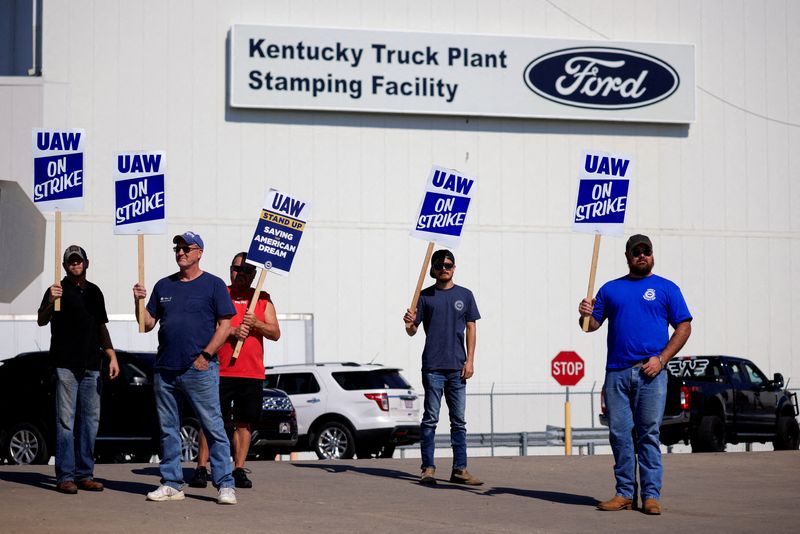Ford, UAW reach tentative deal to end strike – sources
2023.10.25 20:45

© Reuters. FILE PHOTO: United Auto Workers (UAW) union members picket outside Ford’s Kentucky truck plant after going on strike in Louisville, Kentucky, U.S. October 12, 2023. REUTERS/Luke Sharrett//File Photo
By Joseph White and David Shepardson
(Reuters) -Ford Motor and United Auto Workers (UAW) union negotiators reached a tentative labor deal after a six-week strike, three sources familiar with the matter said on Wednesday, a 4-1/2-year contract that would provide a record pay boost.
The deal, which needs approval by union leaders and members, would be the first settlement of strikes by 45,000 workers against Ford (NYSE:), General Motors (NYSE:) and Chrysler-parent Stellantis (NYSE:) that began Sept. 15.
The deal is expected to provide a 25% wage hike over the life of the contract, including 11% to start, two of the sources said. Including compounding and cost of living, workers will get more than 30% under the tentative deal.
UAW President Shawn Fain had not issued a statement confirming an agreement, and Ford had no immediate comment.
If the contract is ratified by Ford workers, it would set the standard for bargaining at General Motors and Stellantis and expire on April 30, 2028.
The Ford contract would give UAW workers a record boost in pay and reverse concessions the union agreed to in a series of contracts since 2007, when GM and the former Chrysler were skidding toward bankruptcy, and Ford was mortgaging its assets to stay afloat.
“This lays the groundwork for the next two contracts and they should fall in line fairly quickly because all three were within a narrow gap of each other,” Sam Fiorani, vice president of global vehicle forecasting at AutoForecast Solutions.
“The strike so far has been painful for everybody and knowing what it takes to get a signed contract should bring them to the table much quicker,” he said.
GM and Stellantis had no immediate comment. CNBC earlier reported the tentative deal.
The UAW’s ratcheted up pressure on the companies by striking at each company’s most profitable plant – GM’s Arlington, Texas assembly plant, Ford’s Kentucky heavy-duty pickup factory and Stellantis’ Ram pickup plant in Sterling Heights, Michigan.
Total economic losses from the auto workers’ strike have reached $9.3 billon, the Anderson Economic Group said earlier this week.
POLITICS, EV SHIFT
The UAW’s campaign to win record pay increases from the Detroit Three attracted attention far beyond Detroit, including U.S. politicians of both parties.
U.S. President Joe Biden joined Fain on a picket line and endorsed the UAW’s demands for record wage increases. Former President Donald Trump, who is running for the Republican nomination in the 2024 presidential election, courted auto workers’ votes in Michigan as well. Michigan and other Midwestern auto states will be pivotal in the elections.
Getting the deal ratified will be up to Fain and UAW leaders, and that is not assured. UAW workers at Mack Truck earlier this month rejected a proposed contract that Fain agreed to. UAW workers at the company now called Stellantis rejected a proposal endorsed by UAW leaders in 2015.
But the auto industry’s shift to electric vehicles raised the stakes for the UAW and the automakers.
GM, Ford and Stellantis all face regulatory pressure to build and sell more EVs in the United States. But GM and Ford have scaled back their EV expansion plans in the face of slower-than-expected demand and competitive pressure from Tesla (NASDAQ:).
UAW leaders feared that the automakers would cut jobs at combustion engine factories and shift work to non-union joint venture battery plants or overseas suppliers.
LOOKING TO FUTURE
In recent months, the union waged an unusual campaign of simultaneous strikes against the Detroit Three automakers, demanding a 40% wage hike, including a 20% immediate increase, improvements in benefits, as well as covering EV battery plant workers under union agreements.
The automakers argued that the UAW’s demands would significantly raise costs and hobble their electric vehicle ambitions, putting them at a disadvantage when compared to Tesla and foreign brands such as Toyota (NYSE:), which are non-unionized.
Rather than the hammer blow of a mass walkout it has wielded historically, the UAW played the companies against each other, using reprieves from expansion of work stoppages as encouragement.
While Fain and other UAW leaders have more work ahead to secure ratified contracts, Fain last week began looking ahead to his next challenge: Organizing workers at Tesla, Toyota, Hyundai (OTC:) and other non-union U.S. auto factories. Their lower-cost labor threatens to undermine UAW job security in the years ahead.
“Non-union auto workers are not the enemy,” Fain said in a video address last week. “Those are our future union family.”








